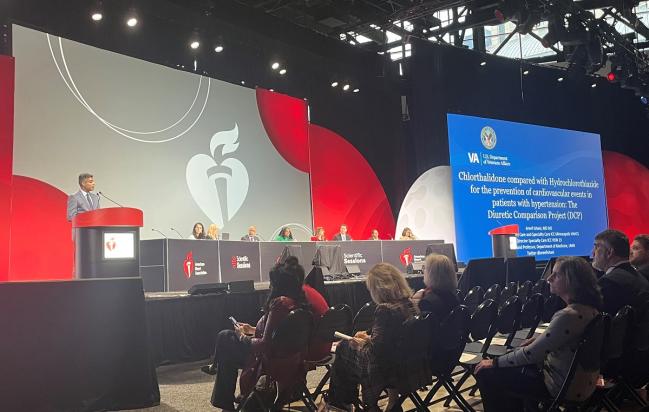In High BP, Chlorthalidone and Hydrochlorothiazide Have Similar Impact on MACE
A suggestion of benefit with chlorthalidone among patients with prior stroke/MI is difficult to interpret, Areef Ishani says.

CHICAGO, IL—Chlorthalidone does not reduce major adverse cardiovascular events compared hydrochlorothiazide in older, predominantly male military veterans with hypertension, according to the randomized Diuretic Comparison Project (DCP).
Through a median follow-up of 2.4 years, the primary MACE outcome—a composite of stroke, MI, hospitalization for heart failure, unstable angina leading to urgent coronary revascularization, or noncancer death—occurred in about 10% of patients in each study arm (HR 1.04; 95% CI 0.94-1.16), Areef Ishani, MD (Minneapolis VA Health Care System and University of Minnesota), reported here at the American Heart Association 2022 Scientific Sessions.
A subgroup analysis suggested that chlorthalidone was beneficial among patients with a history of MI or stroke, about 11% of the total study population, although Ishani said “it’s difficult to understand how to place this in the context of an overall negative trial.”
Ishani said he and his colleagues have been struggling with the question of what these results mean for the choice between these two diuretics in practice, noting that across the world, many more patients are on hydrochlorothiazide versus chlorthalidone. “I think either of the drugs is appropriate to use for the treatment of hypertension,” he added.
What to make of the signal of benefit for chlorthalidone in patients with a history of MI or stroke is unclear and requires additional study, but it might influence clinical decision-making, Ishani indicated. “I think this is a discussion with your patient on how they want to hedge their bets. Because the drugs are so similar, if they said, ‘I want to stay on one drug or another one because of that subgroup,’ I think that’s a conversation to have.”
Diuretic Comparison Project
Chlorthalidone and hydrochlorothiazide both have been used to treat hypertension for decades. Some studies have suggested that chlorthalidone provides better cardiovascular outcomes relative to hydrochlorothiazide, accompanied by improved 24-hour blood pressure control and other pleiotropic effects, Ishani said. But more-recent observational research has indicated similar risks of CVD with each, with the possibility of more adverse events like hypokalemia, acute kidney injury, and chronic kidney disease with chlorthalidone.
In the DCP, investigators set out to explore potential differences between the agents within the integrated healthcare system of the US Veterans Health Administration. Using a pragmatic design, they leveraged electronic medical record (EMRs) to identify physicians and patients to participate and then obtained consent via both mail and telephone.
The trial included 13,523 patients (mean age 72 years; 97% men) who were older than 65, were already taking hydrochlorothiazide at a dose of 25 or 50 mg/day, and had a most-recent systolic BP reading of 120 mm Hg or higher. They were randomized to either remain on their regular dose of hydrochlorothiazide or switch to an equivalent dose of chlorthalidone (12.5 or 25 mg/day). After that point, all patients were managed with usual care and had no further contact with trial investigators. Outcomes were collected through the EMR system, Medicare and VA claims databases, and the National Death Index.
Most patients (94.5%) were on the lower hydrochlorothiazide dose before enrollment, so a similar proportion were placed on the lower chlorthalidone dose after randomization. Throughout the trial, mean systolic BP and mean potassium remained similar in both groups, although over time, there was a slight uptick in the proportion of patients taking a potassium supplement in the chlorthalidone arm.
The MACE rate during follow-up was 10.4% in the chlorthalidone group and 10.0% in the hydrochlorothiazide group. There were no differences for any of the individual components of that endpoint, or for all-cause mortality, any revascularization, and erectile dysfunction.
The treatment effect appeared to vary based on a history of MI or stroke. In patients with such a history, chlorthalidone carried a lower MACE risk (HR 0.73; 95% CI 0.57-0.94), but in those without such a history, chlorthalidone had a higher risk (HR 1.12; 95% CI 1.00-1.26). Ishani cautioned that this could be a change finding, and called for future studies to explore it.
As for expected adverse events, chlorthalidone was associated with higher rates of new allergic or adverse reactions to a thiazide-type diuretic (1.6% vs 0.3%) and hypokalemia (6.0% vs 4.4%), with the latter difference driven by an increase in lab-measured potassium levels below 3.1 mEq/L (5.0% vs 3.6%). Hospitalization for acute kidney injury occurred at comparable rates in the two trial arms.
‘Compelling Results’ but Questions Remain
Discussing the results after Ishani’s presentation, Daniel Levy, MD (National Heart, Lung, and Blood Institute, Framingham, MA), noted that earlier trials, including SHEP and ALLHAT, had established the positive cardiovascular impact of using chlorthalidone. The DCP trial, he said, addressed a major knowledge gap regarding the relative effects of these two antihypertensives using a reasonable, pragmatic design.
Levy highlighted some issues to consider when interpreting the trial. First, he questioned whether the results were biased in favor of hydrochlorothiazide since all participants were already taking the drug before randomization. That would serve to select patients who already had good BP control and few side effects on the diuretic. And second, he wondered whether the results would be generalizable to women and younger patients.
Ultimately, though, the trial is “providing compelling results, even though a few questions do remain,” Levy said.
Think about everybody getting blood pressure control in the country and in the world—this is an important answer telling us that they’re similar. Manesh Patel
Biykem Bozkurt, MD, PhD (Baylor College of Medicine, Houston, TX), during a press conference, also raised some issues to consider, including the open-label design, the potential impact of the lingering effects of hydrochlorothiazide among patients randomized to chlorthalidone, and the lack of information on the effectiveness of decongestion with each agent.
She said she would have liked to see additional subgroup analyses, particularly after the signal in the prior MI/stroke subset was detected, and questioned whether the results would be different among patients with more-advanced disease, such as those with heart failure.
Alluding to TRANSFORM-HF, another pragmatic trial with neutral results presented at the meeting, Bozkurt said, “Both of these studies demonstrate equal effectiveness of diuretic choices in the targeted populations, but the subgroups of patients for which we use these diuretics, the more-potent ones with better bioavailability and longer half-life, I think remains unanswered, meaning we still likely will continue using them in clinical practice for such patients.”
For Manesh Patel, MD (Duke University, Durham, NC), chair of the program committee for this year’s meeting, the DCP highlights the “gift of randomization. Doing large, randomized trials still gives us answers, and especially when you do them pragmatically it gives us important answers. And think about everybody getting blood pressure control in the country and in the world—this is an important answer telling us that they’re similar.”
Addressing the choice between the agents out in practice, Patel told TCTMD that he’s not sure the difference in hypokalemia is meaningful and that, overall, the two diuretics are similar. “In some regards, if you’re treating somebody with one of these two drugs, it’s probably reasonable to stay. I don’t know that you’re going to shift,” he said.
Todd Neale is the Associate News Editor for TCTMD and a Senior Medical Journalist. He got his start in journalism at …
Read Full BioSources
Ishani A. Chlorthalidone compared with hydrochlorothiazide for the prevention of cardiovascular events in patients with hypertension: the Diuretic Comparison Project (DCP). Presented at: AHA 2022. November 5, 2022. Chicago, IL.
Disclosures
- Ishani reports no relevant conflicts of interest.
- Bozkurt reports honoraria from AstraZeneca, Baxter, and Sanofi Aventis and other relationships with Renovacor, Respicardia, Abbott Vascular, LivaNova, Vifor, and Cardurion.
- Patel reports receiving research grants from AstraZeneca, Bayer, Janssen, Procyrion, and HeartFlow and having other relationships with Bayer, Janssen, and Mytonomy.
- Levy reports being the editor-in-chief of the International Journal of Cardiology: Cardiovascular Risk and Prevention.





Comments